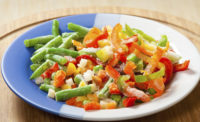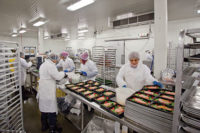The Best-Kept Secret

Manuel Juarez, line operator relief; Mark Schmaus, plant manager; Deb Becker, quality supervisor; and Faith Lovett, environmental control supervisor gather potatoes from one of the local farms.

McCain Foods unveiled Anchor Poppers, which are stuffed with charred, diced poblano and jalapeño peppers, a blend of asadero and mozzarella cheese, whole-roasted corn and black beans.

McCain Foods continues to lead the market with its top-selling items, including Brew City fries, Anchor Poppers, coated fries and Original 1853 Chips.

Sold under the Harvest Splendor brand, Sweet Potato Buttons are button-shaped potato products that boast a crispy exterior and soft, sweet interior.




If you eat French fries, you’ve probably eaten at least one produced by McCain Foods. In fact, one out of every three fries sold worldwide are made in one of McCain Foods’ 30 potato production facilities around the world. McCain Foods, a privately-held, family-owned company based in Toronto, Canada, with U.S. headquarters in Lisle, Ill., churns out more than 150 million pounds of finished French fries a week, globally.
With 50 manufacturing facilities, 160 sales markets and 19,000 employees on six continents, McCain Foods is a global powerhouse, yet it continues to be the industry’s best-kept secret.
That’s why McCain Foods was named Refrigerated & Frozen Foods’ 2012 Frozen Foods Processor of the Year.
Brave beginnings
In 1957, brothers Wallace and Harrison McCain founded McCain Foods in New Brunswick, Canada.
“They were sons of a farming family who saw an opportunity, especially as more and more restaurants popped up and more and more consumers were looking for convenience foods,” says Joe Bybel, vice president of marketing and innovation for McCain Foods USA.
Back then, McCain Foods was a $152,000 company with just 30 employees. Today, the global company produces sweet potato products, tater tots, crispers, crowns, hash browns, potato shells, mashed potatoes and battered French fries and a large portfolio of frozen appetizers for supermarkets, c-stores, delis, fast food and quick-serve restaurants, K-12 schools and the military. While 70% of McCain Foods’ U.S. business is predominantly foodservice, the company is also a major supplier of frozen food products for retail.
“The first stage of the company was very entrepreneurial, while the second stage saw real growth and a concentration on our people,” says Frank Finn, president of the U.S. division. “Now we’re in the third stage, which is about transformation. We’re building the new McCain for the future.”
According to Finn, this means building capabilities that will position the company to offer products that meet a wide variety of consumer needs, best-in-class research and innovation functions.
“The new McCain,” Finn adds, “is about reinvigorating the entrepreneurial spirit that the brothers had, but doing it in a way that respects the standardization and process that has been put in place in order to allow us to focus on growth areas.”
The new McCain includes a newly expanded facility at its Plover, Wis., location (see "No Stranger to Change" on page 40), a better-for-you portfolio of products and an assortment of revamped packaging concepts.
Creating demand where demand does not exist
When the recent recession hit, restaurants suffered. In fact, more and more consumers ditched the diners to prepare meals at home. For companies like McCain Foods, with a large foodservice footprint, this meant it had to create demand where demand did not exist.
“We had almost two decades of out-of-home consumption growth,” says Finn. “People were busy, on the go. But since the economic slowdown, people have re-trenched, they’re pulling in, rediscovering eating in and rediscovering those family moments. What I see happening now in the retail and foodservice area is the stabilization between in-home and out-of-home usage.”
To cater to these “new” consumers, McCain Foods revamped its product portfolio to include a selection of “better-for-you” products.
“We do believe it is our responsibility to make sure our products are as good as they can possibly be,” says Randy Wieland, vice president of sales. “We were one of the first adopters among food companies of zero trans-fat oils, and continually work to reduce sodium in our products where feasible.”
For example, McCain Foods offers multiple products that have never been fried, such as roasted red-skin potatoes for foodservice, and a line of retail products called Purely Potatoes—potatoes that are simply washed, peeled, blanched and frozen, giving consumers a simple, healthy way to prepare potatoes in a variety of different ways.
From processor to innovator
When it comes to developing new products, McCain Foods practices cutting-edge innovation. From creation to consumption, it “starts with a market-facing approach, where you start with the consumer and you work your way back,” according to Finn.
“Our goal is not to try to make people believe that French fries are a health food, but it is to talk about the goodness of potatoes, and how they can fit into a balanced diet without people becoming obese,” Finn adds.
That’s why the folks at McCain Foods conduct market research, follow “white tablecloth” menu trends and food trucks and carry out open innovation with its suppliers, chefs and the Culinary Institute.
“The real difference, I think, is in the culture of the company and the approach to the business relationship with our customers,” says Bybel. “It’s still a family company, and that really comes out in how we do business.”
Whether it’s a large chain or an independent operator, McCain Foods’ objective is to understand their business, the challenges they face and the potential opportunities that drive either their top line sales or their bottom line savings.
“It could be optimizing an appetizer menu that’s specific to their customers’ restaurant type or geographic location, or it could be helping with back-of-house operations to ensure French fries are always served hot and crispy,” Bybel adds. “That goes beyond just selling a product,” Bybel adds.”
“We’re not a niche business, so how do you take potentially very niche flavor palate desires and make them scalable? That’s the balance,” Finn adds. “I can’t tell you how many products I have seen on the cutting board, ‘This is so great,’ but yet it’s kind of individualized. ‘Why don’t you take that product to market? I love that.’ I wish the rest of the market did too. I loved it too. Unfortunately, the mass consumer did not.”
But, just like it takes a village to raise a child, it takes more than the mass consumer to produce a gold standard product.
“We need the growers. We need the industry. We need our customers. We owe it to our consumers and our customers to support this initiative. That would be great if we could do that,” says Finn.
McCain Foods also takes part in what it calls flavor discovery—following the culinary trends, incorporating international flavors and appealing to consumers’ ever-changing palate.
“There is a tremendous amount of work being done by our insights group to understand current trends and examine growing needs, which could result in potential solutions that do not exist today,” Wieland says.
For McCain Foods, this means involving its operators in their research. This may start with concepts, but ultimately gets to the point where McCain Foods provides them with product prototypes to review and try in real restaurant settings. McCain Foods believes it is critical to have a pipeline of future innovation, which is specifically intended to address the needs of its customers.
“In this way, the pipeline continues to grow, and not just with line extensions, but with true innovation that meets the needs of our customers and consumers,” says Wieland.
McCain Foods also continues to lead the market with its top-selling items, including Brew City fries, Anchor Poppers, coated fries (which maintain a 10- to 15-minute hold time for the operator versus a conventional fry) and Original 1853 Chips, a homemade frozen potato chip that’s prepared by the operator and served fresh.
To build on demand beyond the product itself, McCain Foods also underwent a packaging makeover. On the retail side, for instance, products now come in easier-to-open, microwavable bags, while on the foodservice side, McCain Foods will soon roll out a more environmentally-friendly package.
“Communicating a message through your packaging is very important in retail, but in foodservice, the main purpose of packaging is to ensure the short- and long-term quality of the product,” says Wieland. “Right now, with our foodservice potato products, we use paper poly—a brown paper bag with poly lining, which is not recyclable. But, we will soon be utilizing a recyclable clear poly bag for our potatoes, which are much better for the environment while also ensuring product quality.”
McCain Foods may not be a household name among consumers yet, but with the company’s broad understanding of consumer needs, the importance it places on optimizing menus and participating in proprietary innovation, it won’t be a secret much longer.
Popping all the Right Buttons
Thanks to their health-and-wellness halo, a host of varieties and increased availability in stores, consumers have fallen in love with sweet potato fries. Every year for the past several years, this category has grown approximately 40.3%, according to NPD PotatoTrack (2007-2011). That’s why McCain Foods recently added sweet potato fries to its menu.
Adding to its already robust portfolio of sweet potato products, McCain Foods launched Sweet Potato Buttons. Sold under its Harvest Splendor brand, this button-shaped product boasts a crispy exterior and soft, sweet interior.
In honor of the 20th anniversary of Anchor Poppers, Lisle, Ill.-based McCain Foods added new flavors to its Anchor Poppers, which are available for foodservice. These bite-sized starters come in Fire-Roasted Poblano & Jalapeño and Breaded Cheddar Cheese & Jalapeño varieties.
Cream Cheese Poppers are jalapeño halves stuffed with cream cheese and wrapped in a crunchy batter, whereas Cheddar Cheese Poppers are melted cheddar cheese and jalapeño pepper halves enrobed in a crispy batter.
Smashing the Stereotypes
Amid stories of climbing obesity rates, especially among children, health and wellness has become an increasingly important subject over the past few years. Americans are paying more attention to the benefits—as well as the drawbacks—of what they eat. And in this scenario, French fries, one of Americans’ most loved foods, is being portrayed as the poster child of bad eating.
While McCain Foods is not presenting French fries as health food, it is trying to make sure that consumers and the nutrition community understand the real facts about potatoes and French fries in particular.
“Potatoes have high quantities of important nutrients like potassium and fiber, both of which are nutrients that the Dietary Guidelines of America in 2010 identified as nutrients we all need more of in our diet,” says Dr. Jennifer Garrett, global director of nutrition for McCain Foods, based in Toronto, Canada, with U.S. headquarters in Lisle, Ill. “The French fries we’re eating today are nothing like the ones we ate 20 years ago. Most restaurants, including those described as ‘fast food’ use much healthier oils and less salt.”
According to Garrett, McCain Foods wants consumers to know the good things about both potatoes and fries, but also that sound science supports their claims.
To that end, with the help of other major food companies, potato growers and industry groups from Canada and the United States, McCain Foods helped establish the Alliance for Potato Research and Education (APRE). APRE conducts the nutrition science research and education that’s needed to get the facts out about what potatoes offer nutritionally to today’s diet, and to help consumers make choices based on fact.
“For example, 90% of schools in the U.S. bake their fries, and those baked fries become the No. 1 source of potassium and fiber,” Garrett adds.
Media attention or not, McCain Foods is in position to smash the stereotypes and show consumers the healthy side of a potato.
Fast Facts
Company: McCain Foods USA
Headquarters: Toronto, Canada
U.S. Headquarters: Lisle, Ill.
Top Executive: Frank Finn, president, U.S.
Distribution: Global
Total No. of Employees: 19,000
No. of Potato Production Sites: 30
Produces: 150 million pounds of finished French fries a week
Market Reach: Supermarkets, c-stores, delis, fast food and quick-serve restaurants, K-12 schools, military.
McCain Foods 4 Kids
The Alliance for a Healthier Generation, Miami, brings together leading food manufacturers, group purchasing organizations and technology companies to help America’s schools serve healthier meals at more affordable prices.
McCain Foods USA joined the effort to combat childhood obesity by developing, marketing and competitively pricing products that will lead to healthier school meal options, streamline the ordering process and make identifying healthy options easier.
“At McCain Foods, we have made significant investments to ensure we are bringing delicious, innovative new potato product offerings to school menus,” says Frank Finn, president of McCain Foods USA, Lisle, Ill. “These innovations fit the needs of today’s school kitchens, where 80% of schools bake our fries. McCain has also significantly reduced sodium and total fat in many of our school offerings, and we've completely eliminated trans-fats.”
Looking for a reprint of this article?
From high-res PDFs to custom plaques, order your copy today!






